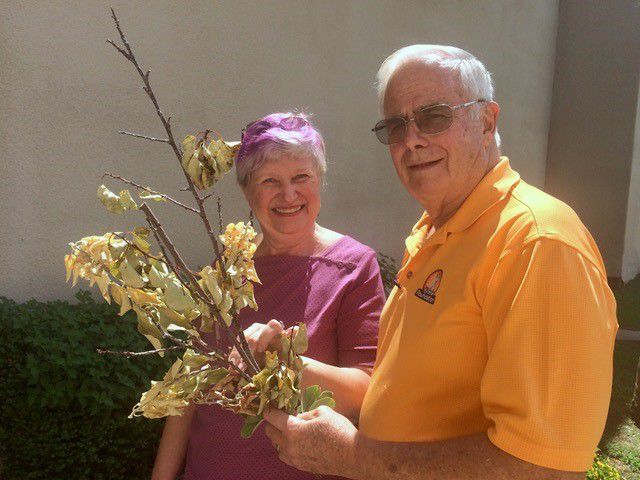Urban Farm Continues to Encourage Fruit Trees in the Desert
Author
Published
9/7/2017
Residents flocked to the organization’s 18th Annual Fruit Tree Program Kickoff, where experts shared their inside knowledge about growing fruit and citrus trees in the Arizona desert climate.

Arthur Campbell and his wife brought a dead branch from their garden to get advice on why their apple tree was failing.
Greg Peterson, 56, founder of Urban Farm, started gardening before the age of 14. “I was born with it. [Gardening] is my destiny; it’s what I’m supposed to be doing,” said Peterson.
In 2001, Greg created the concept of Urban Farm, a “real world environmental showcase” that features an entirely edible landscape and over 75 fruit trees.
The organization’s main goal is to provide the knowledge for growing a healthier life all while getting proper food education.
“I did a seminar–it was a life-changing seminar–where I was to define my mission in life,” Peterson said. “What I created myself to be was the person on the planet responsible for transforming our food system.”
Over the years, Urban Farm has delivered over 30,000 fruit trees to residents all across Arizona.
Peterson explains that growing your own produce saves money, brings entire communities together and is “good for the soul”.
When non-natives think of Arizona, the first thing that comes to mind are temperatures hot enough to fry an egg on the sidewalk, not gardening and the success of fruit trees.
Surprisingly enough, Arizona is one of only four citrus producing states in the nation, along with Florida, California, and Texas.
The state remains the fourth-largest producer of oranges and grapefruits and falls second in nation-wide lemon production.
Arthur Campbell moved to Phoenix from Pennsylvania 17 years ago. Having withdrawals from the greenery of his home-state, he started growing his own fruit trees shortly after.
Campbell, 73, and his wife have what he calls a “modest-sized backyard”.
“We have 11 varieties of citrus and nuts growing in our backyard, as well as grapes,” he explained. “Frankly, what I’ve learned from this seminar is that we have room for more.”
Campbell praised Urban Farm for teaching him what trees work in what climates, and that the process requires very specific nurturing, not a “stick it in the ground and forget it” attitude.
“I started growing my trees because I like fruit,” Campbell said with a laugh. “[Gardening] gives you an appreciation for what it takes to produce food. There’s some pride in being able to go out in the morning and pick your breakfast.”
According to YouTuber and gardener Jake Mace, Arizona is capable of nurturing an impressive variety of trees, not just citrus.
Some of the fruits Mace has successfully harvested in his own backyard include date palms, guava, pecans, pomegranates, avocados, apricots, jujubes and an assortment of berries.
Pegged “The Vegan Athlete”, some of his favorite trees are essential staples in his plant-based diet.
The carob tree’s bean can be used as a substitute for chocolate, while the Moringa tree, one of the “most nutrient-packed foods in the world”, has edible leaves and beans and bark with similar healing properties as aloe vera.
Mace shares his personal tips and tricks with his 80 thousand YouTube subscribers, constantly reminding them of the importance of mulch, or wood chips, to ensure the success of your garden.
“In nature’s garden, trees grow ‘
Mace has found a loophole in getting free mulch for his garden and says it’s a secret anybody can take advantage of.
“It costs companies time and money to dump wood chips at the landfill, so I just call them up and ask them to dump them in my driveway”, Mace shared and suggested asking for a “clean load” of wood.
The expert also praised the innovative abilities of coconut coir, the husk of a coconut, as mulch for gardens because it reduces the evaporation of water, which is crucial for the Arizona heat.
Attendees, both young and old, scribbled helpful tips and tricks on their notepads, chatting about their backyard failures and successes before turning to the experts for advice, who were more than happy to offer suggestions.
In the words of Greg Peterson, “People that dig in the ground are happier”.
To learn more about how you can get involved with The Urban Farm, head to their website at urbanfarm.org.
Editor’s Note: Arizona Farm Bureau’s Julie Murphree has been a guest of Greg Peterson weekly podcast, Urban Farm U.